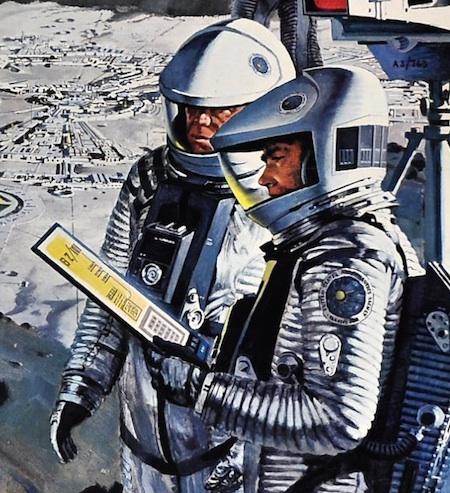Science Fiction
Dictionary
A B C D E F G H I J K L M N O P Q R S T U V W X Y Z
Microsoft's Surface Book Is Part Clipboard

Microsoft's Surface Book is a laptop computer with a surprise - a detachable touch screen that is a highly capable tablet computer - a Clipboard.
(Microsoft Surface Book and Clipboard Video)
The tablet portion of the Clipboard is remarkably similar to Arthur C. Clarke's Newspad, a remarkably prescient look at what we now call tablet computers, from his 1968 novel 2001: A Space Odyssey. In the following excerpt, Heywood Floyd is relaxing on a flight from near earth orbit to the Moon:
When he tired of official reports and memoranda and minutes, he would plug his foolscap-sized Newspad into the ship's information circuit and scan the latest reports from Earth. One by one he would conjure up the world's major electronic papers; he knew the codes of the more important ones by heart, and had no need to consult the list on the back of his pad. Switching to the display unit's short-term memory, he would hold the front page while he quickly searched the headlines and noted the items that interested him...Floyd sometimes wondered if the Newspad, and the fantastic technology behind it, was the last word in man's quest for perfect communications...
(Read more about Arthur C. Clarke's Newspad)
Science fiction readers waited a long time to get their tablet computers. Fans of the 1968 film 2001: A Space Odyssey got a clear view of a tablet computer right on the film's movie poster. As you can see, it's much closer to the size of the Microsoft Clipboard. Clarke describes the Newspad as "foolscap sized" which is a paper size larger than an iPad.

(Poster from 1968 film 2001: A Space Odyssey)
If you're intrigued by Microsoft's Clipboard computer, you might look at the competition, as well as prototype devices:
-
††- In-Flight Wi-Fi Gives Me Clarke Moment
††- Sony Reader Electronic Paper Book
††- News E-Papers From Plastic Logic
††- Buying a Tablet Computer?
††- Murdoch To Create Digital News-Paper
††- Galaxy Tab 10.1 vs. iPad 2 vs. Clarke's Newspad
††- Samsung Cites 'Space Odyssey' Newspad Against iPad In Patent Suit
††- Sony's A4-Sized Flexible Digital Paper Notepad
††- Do You Want A Tablet Computer? Or, Fad Over?
Scroll down for more stories in the same category. (Story submitted 11/6/2015)
Follow this kind of news @Technovelgy.| Email | RSS | Blog It | Stumble | del.icio.us | Digg | Reddit |
Would
you like to contribute a story tip?
It's easy:
Get the URL of the story, and the related sf author, and add
it here.
Comment/Join discussion ( 0 )
Related News Stories - (" Computer ")
Cortex 1 - Today A Warehouse, Tomorrow A Calculator Planet
'There were cubic miles of it, and it glistened like a silvery Christmas tree...' - Clifford Simak, 1949.
Is Agentic AI The Wrong Kind Of Smartness?
'Itís smart enough to go wrong in very complicated ways, but not smart enough to help us find out whatís wrong.' - Isaac Asimov, 1975.
Jetson Orin Nano Super 70 Just $249
'Rayno folded up the microterm and tucked it back inside his jumper.' - Bruce Bethke, 1983.
Automatic Bot Traffic Is 38 Percent Of HTTP Requests
'there were so many worms and counterworms loose in the data-net...' - John Brunner, 1975
Technovelgy (that's tech-novel-gee!) is devoted to the creative science inventions and ideas of sf authors. Look for the Invention Category that interests you, the Glossary, the Invention Timeline, or see what's New.
Science Fiction
Timeline
1600-1899
1900-1939
1940's 1950's
1960's 1970's
1980's 1990's
2000's 2010's
Current News
The New Habitable Zones Include Asimov's Ribbon Worlds
'...there's a narrow belt where the climate is moderate.'
Can One Robot Do Many Tasks?
'... with the Master-operator all you have to do is push one! A remarkable achievement!'
Atlas Robot Makes Uncomfortable Movements
'Not like me. A T-1000, advanced prototype. A mimetic poly-alloy. Liquid metal.'
Boring Company Drills Asimov's Single Vehicle Tunnels
'It was riddled with holes that were the mouths of tunnels.'
Humanoid Robots Tickle The Ivories
'The massive feet working the pedals, arms and hands flashing and glinting...'
A Remarkable Coincidence
'There is a philosophical problem of some difficulty here...'
Cortex 1 - Today A Warehouse, Tomorrow A Calculator Planet
'There were cubic miles of it, and it glistened like a silvery Christmas tree...'
Perching Ambush Drones
'On the chest of drawers something was perched.'
Leader-Follower Autonomous Vehicle Technology
'Jason had been guiding the caravan of cars as usual...'
Golf Ball Test Robot Wears Them Out
"The robot solemnly hit a ball against the wall, picked it up and teed it, hit it again, over and again...'
Boring Company Vegas Loop Like Asimov Said
'There was a wall ahead... It was riddled with holes that were the mouths of tunnels.'
Rigid Metallic Clothing From Science Fiction To You
'...support the interior human structure against Jupiterís pull.'
Is The Seattle Ultrasonics C-200 A Heinlein Vibroblade?
'It ain't a vibroblade. It's steel. Messy.'
Roborock Saros Z70 Is A Robot Vacuum With An Arm
'Anything larger than a BB shot it picked up and placed in a tray...'
A Beautiful Visualization Of Compact Food
'The German chemists have discovered how to supply the needed elements in compact, undiluted form...'
Bone-Building Drug Evenity Approved
'Compounds devised by the biochemists for the rapid building of bone...'
